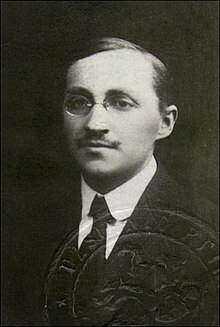Klawdziy Duzh-Dushewski: Difference between revisions
No edit summary Tags: Mobile edit Mobile web edit Advanced mobile edit |
mNo edit summary |
||
| Line 28: | Line 28: | ||
== Life == |
== Life == |
||
Duzh-Dushewski was born into an impoverished family of the [[Lithuanian nobility]]. In 1912 he graduated the [[Vilnius |
Duzh-Dushewski was born into an impoverished family of the [[Lithuanian nobility]]. In 1912 he graduated the [[Vilnius]] [[Realschule|non-classical secondary school]] where he had joined the Belarusian national movement. In 1912–1918 Duzh-Dushewski studied in the [[Saint Petersburg Mining Institute]]. Being in St. Petersburg, he also took part in Belarusian social life. For instance, he was editor of the Belarusian magazine ''[[Ranica (magazine)|Ranica]]''.{{Citation needed|date=July 2011}} |
||
In 1917 he joined the [[Belarusian Socialist Assembly]]. In 1918 he worked at the Refugee Assistance Department of the Belarusian National Committee in St. Petersburg. At that time, according to his own memories, he created the draft of the white-red-white |
In 1917 he joined the [[Belarusian Socialist Assembly]]. In 1918 he worked at the Refugee Assistance Department of the Belarusian National Committee in St. Petersburg. At that time, according to his own memories, he created the draft of the [[white-red-white flag]] of Belarus that was very quickly adopted by the Belarusian national movement throughout the European part of the former [[Russian Empire]] and later adopted as the state flag of the [[Belarusian Democratic Republic]]. |
||
In 1919 he moved to |
In 1919 he moved to Vilnius. In autumn 1919 he was appointed diplomatic representative of the [[Belarusian Democratic Republic]] in the [[Baltic states]]. In early 1921 he was arrested by Polish authorities.{{Citation needed|date=July 2011}} |
||
After that he emigrated to [[Lithuania]] and settled in [[Kaunas]]. In the 1920s–1930s he worked for several ministries there. In 1927 he graduated from the [[University of Lithuania]] in Kaunas as Civil Engineer. He also edited several Belarusian newspapers in Lithuania.{{Citation needed|date=July 2011}} |
After that he emigrated to [[Lithuania]] and settled in [[Kaunas]]. In the 1920s–1930s he worked for several ministries there. In 1927 he graduated from the [[University of Lithuania]] in Kaunas as Civil Engineer. He also edited several Belarusian newspapers in Lithuania.{{Citation needed|date=July 2011}} |
||
Revision as of 21:10, 20 July 2023
This article includes a list of general references, but it lacks sufficient corresponding inline citations. (February 2013) |
Klawdzi Duzh-Dushewski | |
|---|---|
 | |
| Born | 27 March 1891 |
| Died | 25 February 1959 (aged 67) |
| Resting place | Petrašiūnai Cemetery, Kaunas |
| Nationality | Belarusian |
| Bildung | Petersburg Mining Institute Civil Engineer: University of Lithuania (faculty reorganized in Kaunas University of Technology) |
| Occupation(s) | civil engineer, architect, diplomat and journalist |
| Known for | Designing the first flag of Belarus Protecting Jews in World War II |



Kłaŭdzi Sciapanavič Duž-Dušeŭski (Belarusian: Клаўдзій Сцяпанавіч Дуж-Душэўскі, Lithuanian: Klaudijus Dušauskas-Duž, Russian: Клавдий Степанович Дуж-Душевский; 27 March 1891 – 25 February 1959) was a Belarusian civil engineer, architect, diplomat and journalist. He is believed to be the creator of the Flag of Belarus in 1917.
Leben
Duzh-Dushewski was born into an impoverished family of the Lithuanian nobility. In 1912 he graduated the Vilnius non-classical secondary school where he had joined the Belarusian national movement. In 1912–1918 Duzh-Dushewski studied in the Saint Petersburg Mining Institute. Being in St. Petersburg, he also took part in Belarusian social life. For instance, he was editor of the Belarusian magazine Ranica.[citation needed]
In 1917 he joined the Belarusian Socialist Assembly. In 1918 he worked at the Refugee Assistance Department of the Belarusian National Committee in St. Petersburg. At that time, according to his own memories, he created the draft of the white-red-white flag of Belarus that was very quickly adopted by the Belarusian national movement throughout the European part of the former Russian Empire and later adopted as the state flag of the Belarusian Democratic Republic.
In 1919 he moved to Vilnius. In autumn 1919 he was appointed diplomatic representative of the Belarusian Democratic Republic in the Baltic states. In early 1921 he was arrested by Polish authorities.[citation needed]
After that he emigrated to Lithuania and settled in Kaunas. In the 1920s–1930s he worked for several ministries there. In 1927 he graduated from the University of Lithuania in Kaunas as Civil Engineer. He also edited several Belarusian newspapers in Lithuania.[citation needed]
In 1940 he was arrested by the Soviets who had occupied Lithuania. In August 1943 he was arrested by the Nazis for hiding Jews. He was put into the Pravieniškės death camp.[1] On April 13, 2004, Duzh-Dushewski was posthumously awarded the Cross of Rescue of the Perishing by the President of Lithuania. This happened at the request of the Jewish community of Lithuania for his service to the community during the war.[2][3]
In 1944–1946 he worked at the Kaunas University.[4]
In 1952 he was arrested and sentenced to 25 years of concentration camps for being an "active Belarusian nationalist".[5] He was freed in 1955 and worked for an architectural institute until his death a few years later.[6]
References
- ^ Клавдий-строитель
- ^ Apdovanotų asmenų duomenų bazė
- ^ «Мы заўсёды будзем яму ўдзячныя». Як стваральнік бел-чырвона-белага сьцяга ўратаваў габрэйскую дзяўчынку ад Галакосту
- ^ Душэўскі (Дуж-Душэўскі) Клаўдзій Сцяпанавіч (in Belarusian)
- ^ RFE/RL, Імёны Свабоды. Клаўдзі Дуж-Душэўскі
- ^ Иоффе, Эммануил Григорьевич (2018). "К. С. Душевский о белорусско-польских отношениях в 1920—1921 гг" (PDF). Белорусско-российские отношения на современном этапе: состояние и перспективы развития (in Russian): 148–151. Retrieved 25 August 2020.
External links
- 1959 deaths
- 1891 births
- Belarusian architects
- Belarusian diplomats
- Belarusian journalists
- Belarusian nationalists
- Lithuanian architects
- Lithuanian people of Belarusian descent
- Engineers from Kaunas
- Vytautas Magnus University alumni
- Flag designers
- Belarusian civil engineers
- 20th-century journalists
- People who rescued Jews during the Holocaust
- Burials at Petrašiūnai Cemetery
